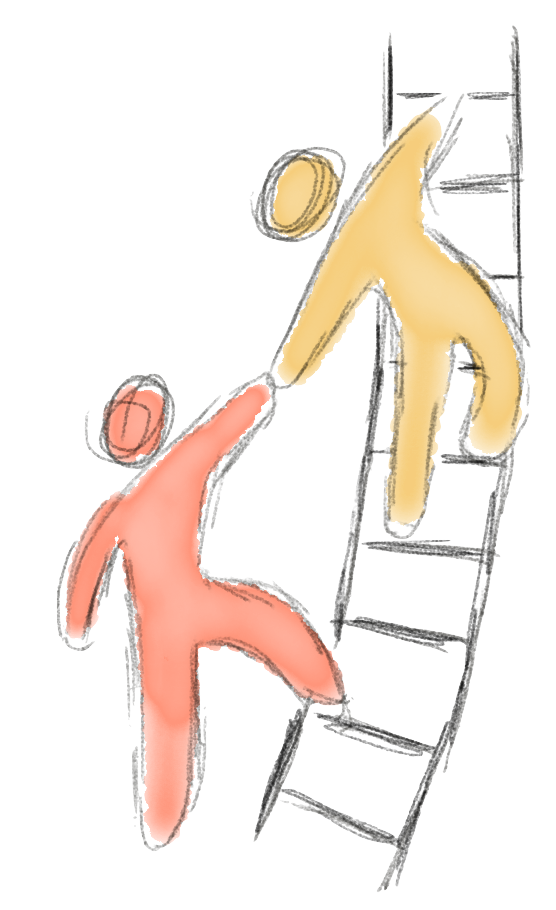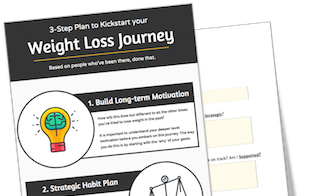Create your own 7 Day Healthy Meal Plan for Weight Loss
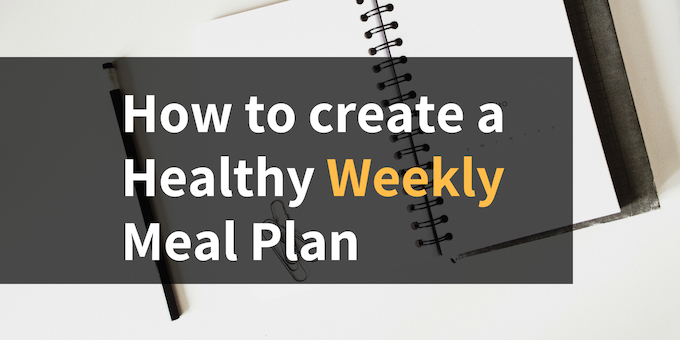
Disclaimer: this post will not give you a generic meal plan to follow.
Instead, it will give you a framework on how to go about building your own custom meal plan. We'll cover actual recipe ideas in a separate post.
Further disclaimer: We won't be counting calories in this process. From my experience of working with people who want to lose weight, counting calories has not been an effective long-term solution from them.
The following post has been an inspiration from the following quote:
"Give a man a fish and you feed him for a day. Teach a man to fish and you feed him for a lifetime."
A lot of people come to me asking for a meal plan.
However deep down I know that a generic meal plan is not a long-term solution.
Everyone's lifestyle and goals will require unique approach to building a healthy weekly plan.
So rather than give you the fish, this post is going to be about teaching you how to fish (i.e. how to build your own healthy meal plan).
Where to start
Before building a weekly meal plan, it is important to know what a healthy, balanced plate actually looks like.
This will vary depending on your goals, but the following plate has been the best place to start for my clients:

Roughly half of your plate should be veggies.
Quarter protein.
Quarter smart carbs.
What about the fats?
We'll get to this in a bit.
But before that, let me a give you some ideas of each food source.
Get creative with Veggies
Yep, half a plate of vegetables is quite a bit.
I won't go into the science behind it but trust me when I say fibre and micronutrients are essential for your bodily processes.
I used to hate vegetables but I found some interesting ways to cook it.
(Jamie Oliver has some great recipe ideas)
Everyone needs to learn how to cook veggies in at least three different ways.
For me, these are:
- Roasted with rosemary and other herbs and spices
- Steamed with olive oil, black pepper and Himalayan salt
- Cooked in an Asian stir fry (I mix up the sauces from soy sauce, teriyaki and even coconut curry)
Side note:
There are so many vegetables that most people don't even know that exist.
Go to your supermarket and try to pick one new vegetable each time.
Here's a list for you:
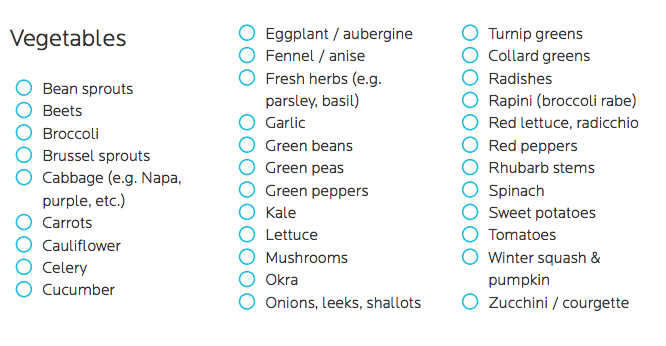
If you would like to know how to store different vegetables, here's a useful page from my local grocery store.
Protein
When it comes to feeling fuller for longer, protein becomes the most important food source.
The way that our body digests protein sends strong fullness cues to our brains.
And many people have found their intake snacks considerable reduce when they incorporate more protein into their diet.
Like the vegetables, I would recommend learning how to cook protein in three different ways for variety throughout the week.
Here are some examples you can choose from:
- Learn how to roast or grill - especially poultry, meat and fish
- Stir-frying or sautéing - which can include vegetarian options such as tofu and tempeh
- Poaching - for those who don't mind simpler flavours
- Slow-cooking in one pot - where you can put all your veggies and protein in one pot and let it stew (yum!)
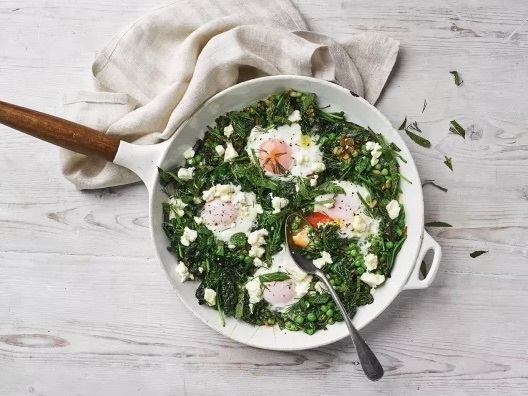
(This Green Shakshuka only takes 25 mins to prepare)
If you're new to cooking, I recommend starting with one type of technique first and build from there.
Have some fun with it and invite your friends to try out your cooking!
Here's a list of protein sources to consider:
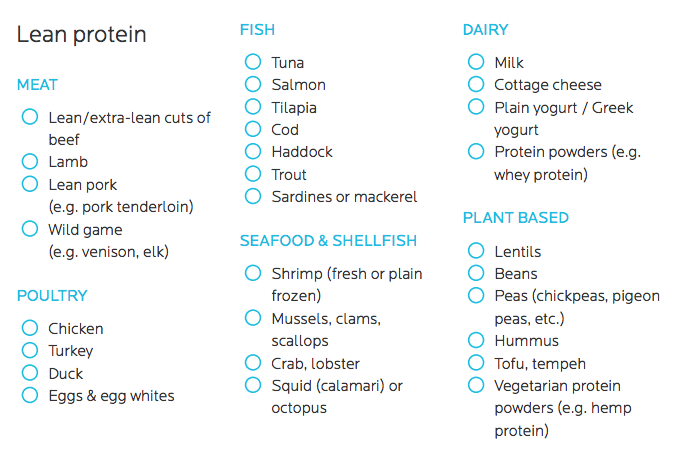
Smart Carbs
There's a lot of misconception about carbs.
There was a movement that started in the US that blamed carbs for the 'obesity epidemic'.
After many years of nutrition research, the conclusion boils down to the following:
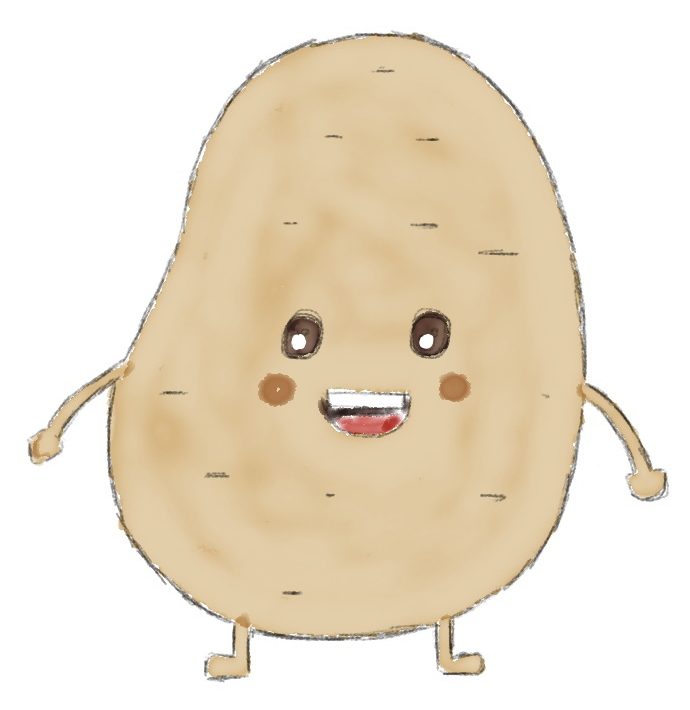
"Not all carbs are made equal"
The carbs that we are mostly exposed to are processed and refined.
These include chips, burgers, pizza - pretty much anything white flour.
In order to 'manufacture' these foods, a lot of the essential nutrients and fibre are taken away.
This means not only do processed carbs lack nutrients, but it also doesn't keep us fuller for longer.
However, there are carbs that retain their nutrient properties and can keep us fuller for longer.
In fact, carbohydrates as an energy source are essential for good health.
Especially if you play sports.
These type of carbs is what we refer to as 'smart carbs'.
They have the fibre to keep us fuller for longer.
And they are a useful energy source for our daily energy requirements.
The most common 'smart carbs' are:
- Rice (both white and brown)
- Potatoes (both sweet and white potatoes - preferably boiled or roasted)
Some others that you may not be aware of:
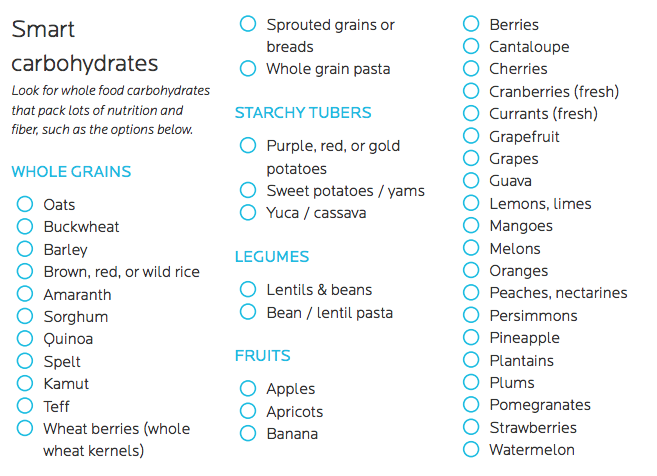
The good things about these are they are easy to cook!
You're mainly boiling them in water until cooked.
With smart carbs, start by incorporating a handful of these and adjust them based on your daily physical requirements.
What about Fats?
We haven't talked about fats yet.
And similar to carbs, there is a lot of misconception around fats.
In the same way as before, there are processed fats and then there are healthy fats.
Healthy fats are essential to our health.
Especially for our organs, skin and hair.
The healthy fats include:
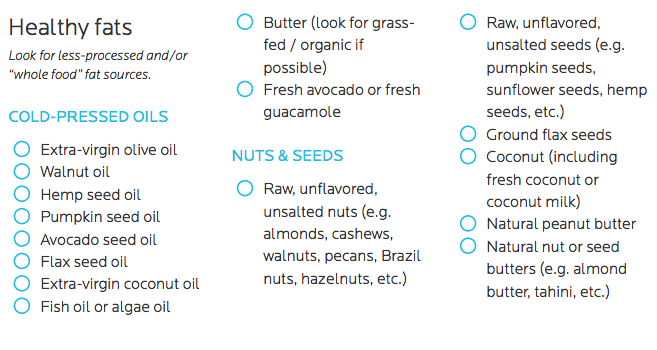
You may have noticed I didn't include fats on the plate diagram at the start of the post.
The reason for this is two fold:
- A lot of the times fats are automatically included in our meals if we are having protein sources such as fatty fish, meat or eggs.
- We need healthy fats in smaller amounts than the other food sources because they are calorie dense.
You can easily incorporate this into your meals by a sprinkle of olive oil or handful of nuts. If you are vegetarian, I recommend you add some avocado and/or olives to your meals.
What about snacks?
Ideally, your meals should be such that you stay full for 3-5 hours.
And if you incorporate protein and whole foods in your diet as mentioned above, you should be able to achieve this consistently.
However, there will be times where you may feel like a snack.
Here's a short video I made on some healthy snacks:
As a quick summary:
- Fruits and nuts are the easiest and most accessible snacks to have
- If you have the time, there are some interesting recipes around the web for ideas.
Putting it all together
You now what a healthy plate looks like.
You have 2-3 different ways to cook your protein and veggies.
You know your 2-3 go to sources for smart carbs and healthy fats.
You have some go to snacks.
Now it's time to put it all together.
For those of you who like a visual representation, I've created a table you can download and fill out:
(Click here to download)
Remember, not everything will always go to plan.
But the more you are organised, the more often you can start having healthy meals consistently.
Some fine tuning needed as you go along
The meal plan template that I shared with you should be used as a starting point.
As you get more in tune with your hunger signals and body requirements, you may feel like adjusting the portion size.
There is a reason why I haven't told you the exact amount of grams and calories you should be having.
This is something your body can decide, IF you are in tune with certain body cues.
There are also some other things to consider that we'll cover in future blog posts.
Additional things to consider:
- Desserts - when and how to include sweets in your plan.
- Emotional eating - a lot of people know what healthy food is but have binge eating episodes. It's important to address the underlying emotions before we do anything!
- Weekend eating - you might be able to follow the plan for 5 days, but the two days can keep sabotaging your efforts.
- How to cook in bulk - if you have a weekly meal plan, it is now time to learn how to batch cook your food. It will save you time and keep you organised.
Stay tuned for blog posts on all of these.
If you want me to cover one of these topics earlier than others, send me a note on kern@bodyknowsbest.net

Unsure where to start?
This worksheet will help you come up with an action plan right now!
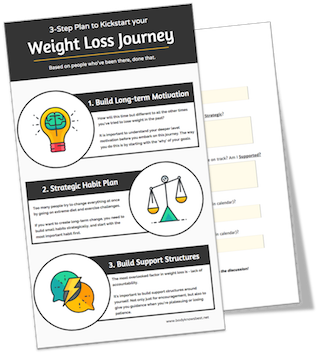
The 3-Step Plan to Kickstart your Weight Loss Journey
About the Author - Kern Kapoor
Kern's interest in psychology and human behaviour lead him to lose 34kg. He is a Certified Nutrition Coach (Pn2) and is currently on a mission is to create a community of 10,000 people who have undergone long-term body transformation.
If you'd like some one-on-one help with your weight loss goals, get in touch with him at kern@bodyknowsbest.net.



